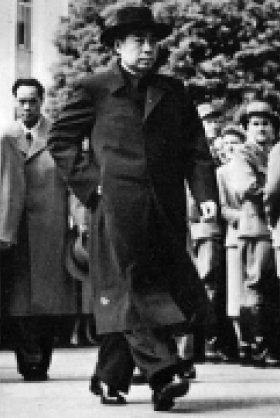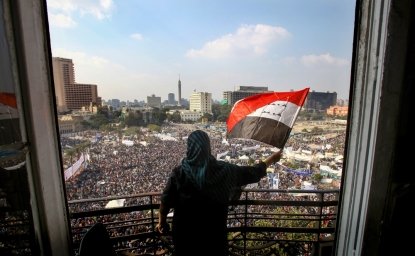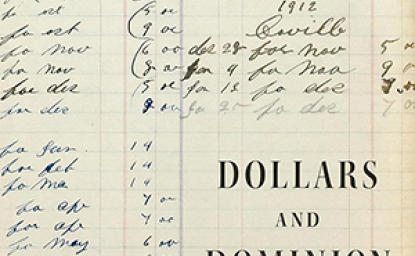Zhou Enlai and China's Response to the Korean War





NKIDP e-Dossier No. 9, "Zhou Enlai and China's Response to the Korean War," is introduced by Charles Kraus and includes 34 translations of Chinese documents which open a new chapter in the diplomatic and military history of the Korean War.
To view the 34 newly translated Chinese documents about the Korean War, please see the link below.
Zhou Enlai and China’s Response to the Korean War
by Charles Kraus
Since the late 1980s and early 1990s, scholarly interest in China’s involvement in the Korean War has been steady and unwavering, nurtured by a constant stream of official Chinese documentary publications.[1] The publication of the first three volumes of Zhou Enlai’s Manuscripts since the Founding of the PRC in 2008, however, has opened a new chapter in the diplomatic and military history of the Korean War, as well as in the study of China’s response to the outbreak of that conflict.[2]
The translated documents included in this collection provide new details of Chinese aid to North Korea in the summer of 1950. Prior to the entry of Chinese troops in October 1950, Zhou Enlai, for example, coordinated the supply of materials to North Korea via Andong (Dandong) and other border cities. According to Zhou’s papers, North Korea even requested that it be allowed to build storehouses in China for the depositing of material aid from fraternal countries. Kim Il Sung also requested that he be allowed to temporarily stow away North Korean factory equipment inside of China so as to avoid the loss of this equipment to American bombs. These documents demonstrate that, even if China had voiced its reservations against Kim Il Sung’s request to launch an invasion of South Korea, China still behaved generously and as an ally in the weeks immediately following June 25.
Acting upon North Korean requests, Zhou Enlai also oversaw the return of ethnic Koreans from China back to North Korea after June 1950. Their numbers were relatively limited in the summer and fall of 1950, but the return of ethnic Koreans was an extensive process, coordinated by all levels of the Chinese government and military. Once inside North Korea, the returnees became immediately involved in the Korean War, serving as doctors, nurses, technicians, and drivers, among other critical positions, on behalf of the North Korean government. These documents thus demonstrate that although the return of ethnic Koreans who would take part in the war effort is typically periodized as a pre-Korean War phenomenon, repatriation in fact continued well into the autumn of 1950.
The documents also underscore how China’s piecemeal response to the Korean War shifted as the autumn of 1950 set upon the peninsula. Significantly, the collection includes cables in which the Chinese offered tactical advice to Kim Il Sung for conducting operations and winning a “protracted war” in September and October. Zhou Enlai’s advice, however, came at a time when North Korea’s military position was rapidly deteriorating, and the series of exchanges between Zhou and Ambassador Ni Zhiliang (who was responsible for conveying Zhou’s remarks to Kim Il Sung) reflect China’s growing uneasiness at the time. In addition to offering advice, then, Zhou began to send Chinese military observers into Korea and invited North Korean leader Pak Il-u to China to receive more detailed reports of the situation on the ground. Zhou Enlai’s Manuscripts offer a clear window into the evolution of Chinese thinking and strategy vis-à-vis the Korean War, helping scholars to understand how and why Chinese troops were ultimately dispatched to Korea.
Of course, much of China’s decision-making at this time was shaped and influenced, either directly or indirectly, by the Soviet Union. Reflecting the nature of the Sino-Soviet alliance in 1950, Zhou Enlai’s Manuscripts also provide new evidence on collaboration and military relations between China and the Soviet Union during the Korean War. Several letters addressed to Stalin, Nikolai Bulganin, and Wang Jiaxiang, the Chinese Ambassador to the USSR, for example, highlight that the Chinese sought both the entry of the Soviet Air Force into the Korean War as well as greater military aid and training from the Soviet Union for Chinese soldiers.
The latter half of the collection contains more than a dozen documents dating from after the entry of the Chinese People’s Volunteers (CPV) into Korea in October 1950. These records include discussions about the relationship between the People’s Volunteer Army and the Korean People’s Army, meetings between Peng Dehuai and Kim Il Sung, the establishment of a Joint Headquarters for Chinese and North Korean troops, Sino-Soviet military and planning coordination, and Chinese negotiation strategies. These documents are of particular interest for understanding the military history of the war following the entry of the CPV and how the trilateral relations among China, North Korea, and the Soviet Union shifted as the Korean War expanded in scope and form.
While the publication of China’s documentary record contributes greatly to the study of China’s Cold War experience, the caveats of these collections are often just as important as their contents. Namely, only the first three volumes of Zhou Enlai’s Manuscripts have been published, and they represent only a small fraction of documents from the years 1949 and 1950. While it is assumed that subsequent volumes will be released with more materials on the Korean War from 1951 through 1953, the publication dates for volume 4 and beyond are presently unknown. Of course, as readers, we will always be left to wonder what has not been included in these collections.
Despite these concerns, there still remains much to be uncovered about China’s involvement in the Korean War and how that conflict shaped Chinese-North Korean relations. Many of Zhou’s papers related to the Korean War from Zhou Enlai’s Manuscripts since the Founding of the PRC have still not been translated. These documents remain useful sources for understanding the dynamics of China’s response to the Korean conflict and should be consulted by interested scholars. Additionally, in 2010, official historians in the People’s Republic of China once again greatly expanded the available documentation with the publication of Mao Zedong’s Military Manuscripts since the Founding of the PRC, a massive three-volume collection.[3] Although featuring many reprints from earlier collections such as Collection of Mao Zedong’s Military Papers and Mao Zedong’s Manuscripts since the Founding of the PRC, the collection notably features previously unpublished documents from the Chinese Central Archives and other archives in China.[4] In other words, though we are more than sixty-years removed from the Korean War, there is still much fodder for historians to work their way through.
***
Charles Kraus is a Program Assistant with the North Korea International Documentation Project at the Woodrow Wilson International Center for Scholars. His publications have previously appeared in the Journal of Cold War Studies, Cold War History, the Journal of Korean Studies, and Chinese Historical Review.
[1] Chen Jian, China’s Road to the Korean War: The Making of Sino-American Confrontation (New York: Columbia University Press, 1994); Chen Jian. Mao’s China and the Cold War (Chapel Hill, NC: University of North Carolina Press, 2001); Bruce Cumings, The Origins of the Korean War, Vol. 2, The Roaring of the Cataract, 1947-1950 (Princeton, NJ: Princeton University Press, 1990), 350-370; Sergei N. Goncharov, John Wilson Lewis, and Xue Litai, Uncertain Partners: Stalin, Mao, and the Korean War (Stanford, CA: Stanford University Press, 1993); Henry Kissinger, On China (New York: Penguin Press, 2011); Xiaobing Li, Allan R. Millet, and Bin Yu, eds., Mao’s Generals Remember Korea (Lawrence, KS: University Press of Kansas, 2001); Allan R. Millet, The War for Korea, 1950-1951: They Came from the North (Lawrence, KS: University Press of Kansas, 2010); Shen Zhihua, “Sino-North Korean Conflict and its Resolution during the Korean War,” trans. Dong Gil Kim and Jeffrey Becker, Cold War International History Project Bulletin 14/15 (Winter 2003-Spring 2004): 9-24; Russel Spurr, Enter the Dragon: China at War in Korea (London: Sidgwick & Jackson, 1989); William Stueck, The Korean War: An International History (Princeton, NJ: Princeton University Press, 1995); Shu Guang Zhang, Mao’s Military Romanticism: China and the Korean War, 1950-1953 (Lawrence, KS: University Press of Kansas, 1995); Zhang Xiaoming, Red Wings over the Yalu: China, the Soviet Union, and the Air War in Korea. (College Station, TX: Texas A&M University Press, 2002).
[2] See Adam Cathcart and Charles Kraus, “The Bonds of Brotherhood: New Evidence on Sino-North Korean Exchanges, 1950-1954,” Journal of Cold War Studies 13, no. 3 (Summer 2011): 27-51 and Shen Zhihua, “Ba duanlian de lishi liantiao lianjie qilai—Jianguo yilai zhou enlai wengao (1-3 ce) de shiliao jiazhi shicui” (“Linking up the Broken Historical Chains: An Excerpt of Valuable Historical Materials from Zhou Enlai’s Manuscripts since the Founding of the PRC, Volumes 1-3”), Dang de Wenxian no. 4 (2008): 59- 68.
[3] Zhonggong zhongyang wenxian yanjiushi and Zhongguo renmin jiefangjun junshi kexueyuan, eds., Jianguo yilai Mao Zedong junshi wengao (Mao Zedong’s Military Manuscripts since the Founding of the PRC), 3 vols. (Beijing: Junshi kexue chubanshe; Zhongyang wenxian chubanshe, 2010).
[4] Mao Zedong, Mao Zedong junshi wenji (Collection of Mao Zedong’s Military Papers), 6 vols. (Beijing: Junshi kexue chubanshe; Zhongyang wenxian chubanshe, 1993); Zhonggong zhongyang wenxian yanjiushi, ed., Jianguo yilai Mao Zedong wengao (Mao Zedong’s Manuscripts since the Founding of the PRC), 13 vols. (Beijing: Zhongyang wenxian chubanshe, 1987-1998).
To download e-Dossier no. 9, "Zhou Enlai and China's Response to the Korean War," and to view 34 newly translated Chinese documents about the Korean War, please see the link below.
***
DOCUMENT LIST
(click document title to be redirected to the Wilson Center Digital Archive)
DOCUMENT NO. 1
Telegram from Zhou Enlai to Bulganin, 13 April 1950
DOCUMENT NO. 2
Telegram from Zhou Enlai to Wang Jiaxiang, 6 May 1950
DOCUMENT NO. 3
Telegram from Zhou Enlai to Bulganin, 13 May 1950
DOCUMENT NO. 4
Telegram from the Party Central Committee to Gao Gang, 11 July 1950
DOCUMENT NO. 5
Telegram from the Party Central Committee to Gao Gang, 18 July 1950
DOCUMENT NO. 6
Report from Zhou Enlai and Nie Rongzhen to Mao Zedong, 22 July 1950
DOCUMENT NO. 7
Telegram from Zhou Enlai to Ni Zhiliang, 23 August 1950
DOCUMENT NO. 8
Letter from Zhou Enlai to Gao Gang, 3 September 1950
DOCUMENT NO. 9
Telegram from Zhou Enlai to Ni Zhiliang, 20 September 1950
DOCUMENT NO. 10
Telegram from Zhou Enlai to Ni Zhiliang, 29 September 1950
DOCUMENT NO. 11
Telegram from Zhou Enlai to Kim Il Sung, 1 October 1950
DOCUMENT NO. 12
Telegram from Zhou Enlai to Ni Zhiliang, 2 October 1950
DOCUMENT NO. 13
Telegram from Zhou Enlai to Gao Gang, etc., 4 October 1950
DOCUMENT NO. 14
Telegram from Zhou Enlai to Ni Zhiliang, 4 October 1950
DOCUMENT NO. 15
Telegram from Zhou Enlai to Ni Zhiliang, 5 October 1950
DOCUMENT NO. 16
Telegram from Zhou Enlai to Ni Zhiliang, 7 October 1950
DOCUMENT NO. 17
Letter from Zhou Enlai to Stalin, 14 October 1950
DOCUMENT NO. 18
Telegram from Zhou Enlai to Chai Junwu, 19 October 1950
DOCUMENT NO. 19
Letter from Zhou Enlai to Mao Zedong and Liu Shaoqi, 29 October 1950
DOCUMENT NO. 20
Telegram from Zhou Enlai to Chai Junwu, 8 November 1950
DOCUMENT NO. 21
Telegram from Zhou Enlai to Chai Junwu, etc., 8 November 1950
DOCUMENT NO. 22
Telegram from Zhou Enlai to Chai Junwu, 12 November 1950
DOCUMENT NO. 23
Letter from Zhou Enlai to Mao Zedong and Others, 15 November 1950
DOCUMENT NO. 24
Telegram from Mao Zedong to Stalin, 15 November 1950
DOCUMENT NO. 25
Telegram from Mao Zedong to Peng Dehuai, 17 November 1950
DOCUMENT NO. 26
Telegram from Zhou Enlai to Wu Xiuquan and Qiao Guanhua, 3 December 1950\
DOCUMENT NO. 28
Letter from Zhou Enlai to Mao Zedong, 8 December 1950
DOCUMENT NO. 30
Letter from Zhou Enlai to Mao Zedong, 9 December 1950
DOCUMENT NO. 31
Letter from Zhou Enlai to Mao Zedong, 9 December 1950
DOCUMENT NO. 32
Report from Zhou Enlai to Mao Zedong, 12 December 1950
DOCUMENT NO. 33
Telegram from Zhou Enlai to Wu Xiuquan and Qiao Guanhua, 13 December 1950
DOCUMENT NO. 34
Telegram from Zhou Enlai to Wu Xiuquan and Qiao Guanhua, 16 December 1950
Author


North Korea International Documentation Project
The North Korea International Documentation Project serves as an informational clearinghouse on North Korea for the scholarly and policymaking communities, disseminating documents on the DPRK from its former communist allies that provide valuable insight into the actions and nature of the North Korean state. Read more


Cold War International History Project
The Cold War International History Project supports the full and prompt release of historical materials by governments on all sides of the Cold War. Read more


History and Public Policy Program
A global leader in making key archival records accessible and fostering informed analysis, discussion, and debate on foreign policy, past and present. Read more


Hyundai Motor-Korea Foundation Center for Korean History and Public Policy
The Center for Korean History and Public Policy was established in 2015 with the generous support of the Hyundai Motor Company and the Korea Foundation to provide a coherent, long-term platform for improving historical understanding of Korea and informing the public policy debate on the Korean peninsula in the United States and beyond. Read more

Explore More
Browse Insights & Analysis
New Evidence on the Korean War

China and the Post-War Reconstruction of North Korea, 1953-1961

